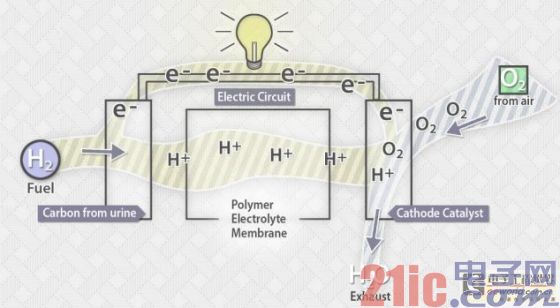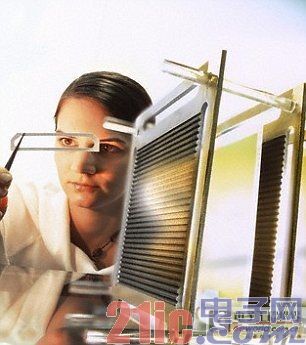Scientists develop uranium-powered fuel cells: catalytic instead of platinum
This article refers to the address: http://
Korean scientists want to use human urine to generate electricity and then supply it to cars, homes and cities. They plan to replace the expensive platinum in fuel cells with carbon naturally present in human urine. The photo shows a fuel cell car. This car has nothing to do with the project, but one day it may benefit from this technology.

At the anode, a catalyst, usually platinum, separates the electrons of the hydrogen atoms, leaving positively charged hydrogen ions and free electrons. A membrane between the anode and the cathode only allows passage of hydrogen ions. This means that the electrons only move along the outer circuit, which in turn generates a current.

Scientists hope that fuel cells will have a wide range of applications in the future.

The problem is that the catalyst in the fuel cell is too expensive and its high cost has now inhibited the commercial development of this technology. But by replacing platinum with carbon in the urine, researchers can significantly reduce costs.
Beijing time on the 18th, according to foreign media reports, the world produces about 10.5 billion liters of urine a day, which is enough to fill 4,200 Olympic swimming pools. Although most of us will label it as a waste, scientists hope to use one day to generate electricity and then supply it to cars, homes and cities.
A team of scientists at Korea's Korea University outlined a plan to make cheap electricity from carbon atoms in human urine. The researchers said they would replace the expensive platinum in fuel cells with carbon naturally present in human urine. Fuel cells are a promising technology for converting chemical energy into electrical energy through a hydrogen-oxygen reaction.
According to this technique, hydrogen is sent to the negatively charged anode on the fuel cell side while oxygen is sent to the positively charged cathode on the other side of the fuel cell. At the anode, a catalyst, usually platinum, separates the electrons of the hydrogen atoms, leaving positively charged hydrogen ions and free electrons. A membrane between the anode and the cathode only allows passage of hydrogen ions. This means that the electrons only move along the outer circuit, which in turn generates a current.
Scientists hope that fuel cells will have a wide range of applications in the future to provide electricity for cars and homes. The problem is that the catalyst in the fuel cell is too expensive and its high cost has now inhibited the commercial development of this technology. But by replacing platinum with carbon with similar properties, Korean researchers believe they may significantly reduce the cost of fuel cells.
Jong-Sung Yu, head of the research and Korea University, said that using urine as a commodity rather than a waste would also have environmental benefits. He said: "Micro-contaminants such as drugs in the urine will enter the water. Like fuel cells, the carbon obtained from the urine can also be used in battery applications."
LifePO4 Motorcycle STARTING Battery
A-class lithium cells
Superior selection for materials & parts
Exquisite workmanship
High-quality handicraft grade look and workmanshipHigh class ABS container with abrasive coating
High class brass terminals make low internal resistance and strong discharge performance
Convenient installation in Motorcycle.
LiFePO4 Motorcycle Starting Batteries
Motorcycle Battery,Lithium Motorcycle Battery,Motorcycle Starting Batteries,LiFePO4 Batteries
Starlight Power Industrial Company Limited , https://www.starlite-power.com